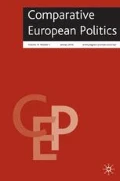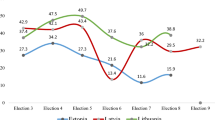Abstract
The article shows how the main regionalist parties in Scotland and Wales—the Scottish National Party and Plaid Cymru—have engaged with a populist discourse in the wake of the Great Recession. Based on a qualitative analysis of party manifestos and party-elite interviews, the article shows that the two parties have adopted a left-wing populist discourse, based on a critique of austerity policies. In this way, albeit from distinctively regionalist perspective, they performed roles very similar to that of other contemporary left-wing populist parties, particularly in Southern Europe. The Scottish National Party and Plaid Cymru were able to frame their anti-austerity stances within a populist discourse because all three traditional British parties shared a preference for pro-austerity economic policies. Therefore, in Laclau’s terms, the two ‘Celtic’ parties’ attack on austerity constituted an open challenge to the hegemonic discourse of the British ‘power bloc’. Analogous to the expansion of a right-wing anti-establishment protest in British politics (monopolized by the UKIP), the two parties (particularly the Scottish one) capitalized on the expansion of a left-wing populist area. This strategy has lately become less viable because Jeremy Corbyn’s Labour party broke with the pro-austerity consensus among British elites.


Source Author’s elaboration on the basis of data from Allen et al. (2017)
Similar content being viewed by others
Notes
See also Mazzoleni and Ruzza (2018) in this special issue.
Plaid Cymru did try to increase its visibility by playing the card of a possible post-election anti-Tory coalition, also in virtue of its long relationship with the SNP: “It is likely that there will be another hung parliament after the election. In that scenario, Plaid Cymru could hold the balance of power alongside our colleagues in the SNP. Should that happen, Plaid Cymru will seek a rebalancing of power and wealth in the UK. If the people of Wales return a strong team of Plaid Cymru MPs in May, then Wales will be best placed to secure an outcome to improve the prospects of our people and communities” (Plaid Cymru 2015: p. 3). However, in contrast to the SNP, Plaid Cymru remained largely ignored in the UK-wide election debate.
The Five Stars Movement in Italy and Syriza in Greece are two classic examples of populist parties who engage in this kind of strategies (Segatti and Capuzzi 2016).
References
Albertazzi, D. 2006. The Lega dei Ticinesi: The Embodiment of Populism. Politics 26(2): 133–139.
Allen, N., J. Bara, and J. Bartle. 2017. Finding a niche? Challenger parties and issue emphasis in the 2015 televised leaders’ debates. British Journal of Politics and International Relations 19(4): 807–823.
Bale, T. 2015. Five Year Mission: The Labour Party under Ed Miliband. Oxford: Oxford University Press.
BBC News. 2015. BBC Election Debate, 16 April. http://www.bbc.com/news/live/election-2015-32313846. Accessed 2 September 2015.
BBC News. 2017. 23 August. https://www.bbc.co.uk/news/av/uk-scotland-41031109/jeremy-corbyn-calls-on-snp-to-use-powers-to-offset-austerity. Accessed on 07 September 2017.
Betz, H.-G. 1994. Radical Right-wing populism in Western Europe. New York: St. Martin’s Press.
Betz, H.-G. and S. Immerfall (eds.). 1998. The New Politics of the Right: Neo-Populist Parties and Movements in Established Democracies. London: Macmillan.
Brading, R. 2013. Populism in Venezuela. London: Routledge.
Combes, T. D. 1977. The Party of Wales, Plaid Cyrmu: Populist Nationalism in Contemporary British Politics. Unpublished PhD thesis, University of Connecticut.
Cowely, P. 2015. The Unusual Cohesion of SNP MPs. Revolts, 24 November [blog]. http://revolts.co.uk/?p=923. Accessed 6 March 2017.
De Winter, L. 1998. A Comparative Analysis of electoral, office and policy success of ethnoregionalist parties. In Regionalist Parties in Western Europe, ed. L. De Winter and H. Türsan, 204–247. London: Routledge.
De Winters, L., M. Gomez-Reino, and J. Buelens. 2006. In Autonomist parties in Europe: Identity politics and the revival of the territorial cleavage vol. II, eds. De Winters, L., M. Gomez-Reino, and P. Lynch, 47–78. Barcelona: ICPS.
Elias, A. 2011. Plaid Cymru. In From Protest to Power: Autonomist Parties and the Challenges of Representation, ed. A. Elias and F. Tronconi, 259–282. Vienna: Braumuller.
Fitjar, R. D. 2010. The Rise of Regionalism: Causes of Regional Mobilization in Western Europe. Routledge, Abingdon.
Flinders, M. 2015. The general rejection? Political disengagement, disaffected democrats and ‘doing politics’ differently. Parliamentary Affairs 68(1): 241–254.
Gramsci, A. 1999. Selection from Prison Notebooks. London: ElecBook (edited and translated by Hoare Q. and G. Nowell Smith).
Grimshaw, D., and J. Rubery. 2012. The end of the UK’s liberal collectivist social model? The implications of the coalition government’s policy under the austerity crisis. Cambridge Journal of Economics 36(1): 105–126.
Harten, S. 2011. The Rise of Evo Morales and the MAS. New York: Zed Books.
Hawkins, K. 2003. Populism in Venezuela: the rise of Chavismo. Third World Quarterly 24(6): 1137–1160.
Hay, C. 1994. Labour’s Thatcherite Revisionism: Playing the ‘Politics of Catch-up. Political Studies 42(4): 700–707.
Heinisch, R., E. Massetti, and O. Mazzoleni. (2018) Populism and Ethno-Territorial Politics in European Multilevel Systems. Comparative European Politics (This Special issue).
Hough, D., and M. Koss. 2009. A Regional(ist) Party in Denial? The German PDS and its Arrival in Unified Germany. Regional & Federal Studies 19(4/5): 579–593.
Keating, M. 1996. Nations Against the State. Basingstoke: Palgrave.
Keating, M. 2017. Debating Scotland. Oxford: Oxford University Press.
Kioupkiolis, A. 2016. Podemos: the ambiguous promises of left-wing populism in contemporary Spain. Journal of Political Ideologies 21(2): 99–120.
Laclau, E. 1977. Politics and Ideology in Marxist Theory: Capitalism-Fascism- Populism. London: Verso.
Laclau, E. 2005a. On Populist Reason. London: Verso.
Laclau, E. 2005b. What’s in a name? In Populism and the Mirror of Democracy, ed. F. Panizza, 32–49. London: Verso.
Lee, S., and M. Beech. 2011. The Cameron-Clegg Government: Coalition Politics in an Age of Austerity. Basingstoke: Palgrave.
Lynch, P. 1995. From Red to Green: The political strategy of Plaid Cymru in the 1980s and 1990s. Regional and Federal Studies 5(2): 197–210.
Lynch, P. 2002. SNP: The History of the Scottish National Party. Cardiff: Welsh Academic Press.
Lynch, P. 2011. The Scottish National Party. In From Protest to Power: Autonomist Parties and the Challenges of Representation, ed. A. Elias and F. Tronconi. Vienna: Braumuller.
March, L. 2017. Left and right populism compared: The British case. British Journal of Politics and International Relations 19(2): 282–303.
March, L., and C. Mudde. 2005. What’s left of the radical left? The European radical left after 1989: Decline and mutation. Comparative European Politics 3(1): 23–49.
Massetti, E. 2009a. Explaining Regionalist Party Positioning in a Multi-dimensional Ideological Space: A Framework for Analysis. Regional and Federal Studies 19(4/5): 501–531.
Massetti, E. 2009b. The Scottish and Welsh Party Systems Ten Years after Devolution: Format, Ideological Polarization and Structure of Competition. SEI Working Paper 107.
Massetti, E., and A. Schakel. 2015. From Class to Region: How Regionalist Parties Link (and subsume) Left-right Into centre-periphery Politics. Party Politics 21(6): 866–886.
Mazzoleni, O. 2005. Multi-Level Populism and Centre-Periphery Politics Cleavage in Switzerland: The Case of the Lega dei Ticinesi. In Challenges to Consensual Politics: Democracy, identity and Populist Protest in the Alpine Region, ed. D. Caramani and Y. Meny, 209–227. Brussels: Peter Lang.
McAllister, L. 2001. Plaid Cymru: The Emergence of a Political Party. Cardiff: Seren.
McAngus, C. 2016. Party elites and the search for credibility: Plaid Cymru and the SNP as new parties of government. British Journal of Politics & International Relations 18(3): 634–649.
McDonnell, D., and D. Vampa. 2016. The Italian Lega Nord. In Understanding Populist Party Organisation: The Radical Right in Western Europe, ed. R. Heinisch and O. Mazzoleni. Palgrave: Basingstoke.
Meguid, B. 2008. Party Competition between Unequals: Strategies and Electoral Fortunes in Western Europe. Cambridge University Press, Cambridge.
Meyer, T.M., and B. Miller. 2015. The niche party concept and its measurement. Party Politics 21(2): 259–271.
Mitchell, J. 2015. Sea Change in Scotland. Parliamentary Affairs 68(Suppl 1): 88–100.
Mudde, C. 2004. The Populist Zeitgeist. Government and Opposition 39(4): 542–563.
Mudde, C. 2007. Populist Radical Right parties in Europe. Cambridge: Cambridge University Press.
Mudde, C. 2017. Syriza: The Failure of the Populist Promise. Berlin: Springer.
Mudde, C., and C. Rovira Kaltwasser. 2012. Populism in Europe and the Americas: Threat or Corrective for Democracy? Cambridge University Press, Cambridge.
New Statesmen. 2016. 10 February. http://www.newstatesman.com/politics/economy/2016/02/how-small-tax-rise-exposed-snps-anti-austerity-talk-just. Accessed 06 April 2017.
Otjes, S., and T. Louwers. 2015. Populists in Parliament: Comparing Left-Wing and Right-Wing Populism in the Netherlands. Political Studies 63(1): 60–79.
Plaid, Cymru. 2010. Think Different, Think Plaid. Conwy: Manifesto for the General Election.
Plaid, Cymru. 2011. For a Better Wales. Conwy: Manifesto for the Welsh Election.
Plaid, Cymru. 2015. Working for Wales. Conwy: Manifesto for General Election.
Plaid, Cymru. 2017. Defending Wales. Conwy: Manifesto for the General Election.
Polk et al. 2017. Explaining the salience of anti-elitism and reducing political corruption for political parties in Europe with the 2014 Chapel Hill Expert Survey data. Research and Politics 1–9. http://chesdata.eu/.
Ramiro, L., and R. Gomez. 2016. Radical-Left Populism during the Great Recession: Podemos and Its Competition with the Established Radical Left. Political Studies 65(1): 108–125.
Rooduijn, M., and T. Akkerman. 2017. Flank attacks: Populism and left-right radicalism in Western Europe. Party Politics 23(3): 193–204.
Rydgren, J. 2005. Movements of Exclusion: Radical Right-Wing Populism in the Western World. New York: Nova.
Scottish Government. 2013. Scotland’s Economy: The Case for Independence, May 2013. http://www.scotland.gov.uk/Publications/2013/05/4084. Accessed 02 June 2014.
Scottish National Party. 2010. Elect a Local Champion. Glasgow: Manifesto for the General Election.
Scottish National Party. 2015. Stronger for Scotland. Glasgow: Manifesto for the General Election.
Scottish National Party. 2016. Re-Elect. Glasgow: Manifesto for the Scottish Election.
Scottish National Party. 2017. Stronger for Scotland. Glasgow: Manifesto for the General Election.
Scully, R., D. Trystan, and R. Wyn Jones. 2003. Explaining the Quiet Earthquake: Voting Behaviour in the First Election to the National Assembly for Wales. Electoral Studies 22: 635–650.
Segatti, P., and F. Capuzzi. 2016. Five Stars Movement, Syriza and Podemos: A Mediterranean Model? In Beyond Trump: Populism on the Rise, ed. A. Martinelli, 47–72. Milan: ISPI.
Stanley, B. 2008. The thin ideology of populism. Journal of Political Ideologies 13(1): 95–110.
Stavrakakis, Y., and G. Katsambekis. 2014. Left-wing populism in the European periphery: the case of SYRIZA. Journal of Political Ideologies 19(2): 119–142.
Taggart, P. 2000. Populism. Philadelphia: Open University Press.
The Guardian. 2015. Leaders’ debate: all you need to know about the 7-way clash, 3 April. http://www.theguardian.com/politics/2015/apr/03/leaders-debate-all-you-need-to-know-about-the-seven-way-clash. Accessed 2 September 2015.
The Guardian. 2017. Richard Leonard wins Scottish Labour leadership in decisive victory, 18 November. https://www.theguardian.com/politics/2017/nov/18/richard-leonard-voted-scottish-labour-leader. Accessed on 20 November 2017.
The Independent. 2015. 11 February. http://www.independent.co.uk/news/uk/politics/snp-leader-nicola-sturgeon-hits-out-against-austerity-in-major-new-election-pitch-10038677.html. Accessed 6 March 2017.
Thompson, L. 2018. Understanding third parties at Westminster: The SNP in the 2015 parliament. Politics 38(4): 443–457.
Author information
Authors and Affiliations
Corresponding author
Rights and permissions
About this article
Cite this article
Massetti, E. Left-wing regionalist populism in the ‘Celtic’ peripheries: Plaid Cymru and the Scottish National Party’s anti-austerity challenge against the British elites. Comp Eur Polit 16, 937–953 (2018). https://doi.org/10.1057/s41295-018-0136-z
Published:
Issue Date:
DOI: https://doi.org/10.1057/s41295-018-0136-z




